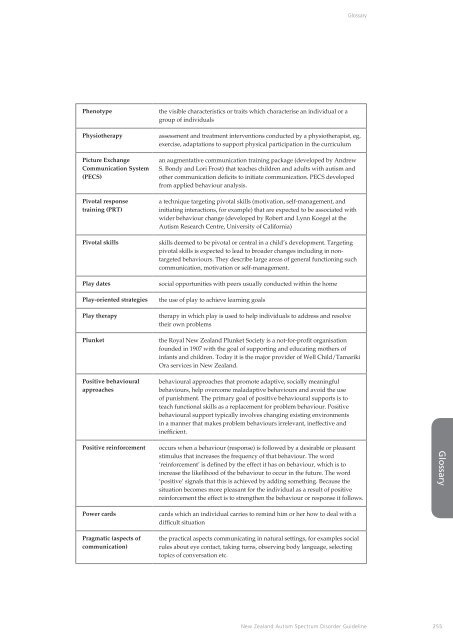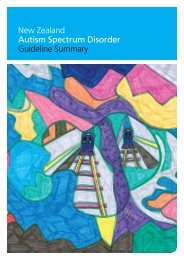New Zealand Autism Spectrum Disorder Guideline - Ministry of Health
New Zealand Autism Spectrum Disorder Guideline - Ministry of Health
New Zealand Autism Spectrum Disorder Guideline - Ministry of Health
Create successful ePaper yourself
Turn your PDF publications into a flip-book with our unique Google optimized e-Paper software.
Glossary<br />
Phenotype<br />
Physiotherapy<br />
Picture Exchange<br />
Communication System<br />
(PECS)<br />
Pivotal response<br />
training (PRT)<br />
Pivotal skills<br />
Play dates<br />
Play-oriented strategies<br />
Play therapy<br />
Plunket<br />
Positive behavioural<br />
approaches<br />
the visible characteristics or traits which characterise an individual or a<br />
group <strong>of</strong> individuals<br />
assessment and treatment interventions conducted by a physiotherapist, eg,<br />
exercise, adaptations to support physical participation in the curriculum<br />
an augmentative communication training package (developed by Andrew<br />
S. Bondy and Lori Frost) that teaches children and adults with autism and<br />
other communication deficits to initiate communication. PECS developed<br />
from applied behaviour analysis.<br />
a technique targeting pivotal skills (motivation, self-management, and<br />
initiating interactions, for example) that are expected to be associated with<br />
wider behaviour change (developed by Robert and Lynn Koegel at the<br />
<strong>Autism</strong> Research Centre, University <strong>of</strong> California)<br />
skills deemed to be pivotal or central in a child’s development. Targeting<br />
pivotal skills is expected to lead to broader changes including in nontargeted<br />
behaviours. They describe large areas <strong>of</strong> general functioning such<br />
communication, motivation or self-management.<br />
social opportunities with peers usually conducted within the home<br />
the use <strong>of</strong> play to achieve learning goals<br />
therapy in which play is used to help individuals to address and resolve<br />
their own problems<br />
the Royal <strong>New</strong> <strong>Zealand</strong> Plunket Society is a not-for-pr<strong>of</strong>it organisation<br />
founded in 1907 with the goal <strong>of</strong> supporting and educating mothers <strong>of</strong><br />
infants and children. Today it is the major provider <strong>of</strong> Well Child/Tamariki<br />
Ora services in <strong>New</strong> <strong>Zealand</strong>.<br />
behavioural approaches that promote adaptive, socially meaningful<br />
behaviours, help overcome maladaptive behaviours and avoid the use<br />
<strong>of</strong> punishment. The primary goal <strong>of</strong> positive behavioural supports is to<br />
teach functional skills as a replacement for problem behaviour. Positive<br />
behavioural support typically involves changing existing environments<br />
in a manner that makes problem behaviours irrelevant, ineffective and<br />
inefficient.<br />
Positive reinforcement<br />
occurs when a behaviour (response) is followed by a desirable or pleasant<br />
stimulus that increases the frequency <strong>of</strong> that behaviour. The word<br />
‘reinforcement’ is defined by the effect it has on behaviour, which is to<br />
increase the likelihood <strong>of</strong> the behaviour to occur in the future. The word<br />
‘positive’ signals that this is achieved by adding something. Because the<br />
situation becomes more pleasant for the individual as a result <strong>of</strong> positive<br />
reinforcement the effect is to strengthen the behaviour or response it follows.<br />
Glossary<br />
Power cards<br />
Pragmatic (aspects <strong>of</strong><br />
communication)<br />
cards which an individual carries to remind him or her how to deal with a<br />
difficult situation<br />
the practical aspects communicating in natural settings, for examples social<br />
rules about eye contact, taking turns, observing body language, selecting<br />
topics <strong>of</strong> conversation etc.<br />
<strong>New</strong> <strong>Zealand</strong> <strong>Autism</strong> <strong>Spectrum</strong> <strong>Disorder</strong> <strong>Guideline</strong> 255











